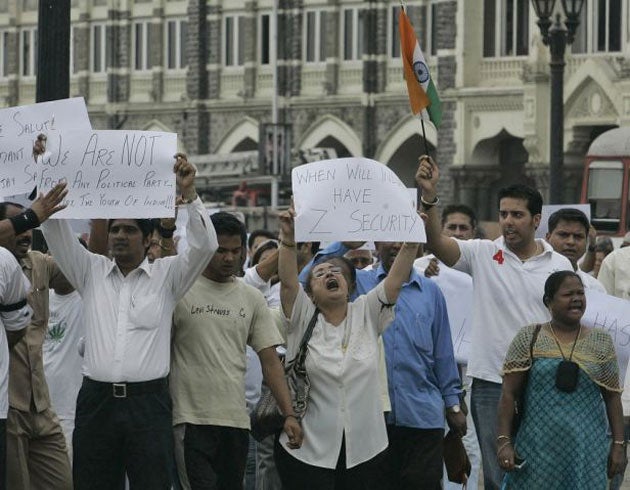Indians demand to know why warnings were ignored

The recrimination and fallout from the Mumbai terror attacks has begun, with two senior Indian government officials being forced to resign amid accusations of security failings and missed warnings. The central government's Home Minister, Shivraj Patil, tendered his resignation after a heated meeting of senior members of the ruling Congress Party in Delhi on Saturday evening. Officials also said the national security adviser, MK Narayanan, had also stood down and suggested the resignation of other security and intelligence officials could follow.
Ahead of a general election that must be held within six months, the resignations – in effect, sackings – may be seen more as necessary political scalps rather than the start of a security overall. However, in the aftermath of the Mumbai attacks in which at least 170 people died, there is emerging evidence of a number of security failings and mounting frustration with the lack of action by politicians. A headline in one Indian newspaper yesterday read: "Our politicians fiddle as innocents die."
Reports said that, in advance of the attacks, India's intelligence services had delivered at least three precise warnings that a large terror strike on Mumbai was imminent. Less than two weeks ago, the Research and Analysis Wing, India's foreign intelligence agency, intercepted a satellite phone conversation in which a person said they were heading for Mumbai with an unspecified cargo. The Hindu newspaper said the call was made to a number known to be used by the Pakistan-based militant group Lashkar-e-Taiba.
Other warnings were given of possible attacks on high-profile hotels, including Mumbai's Taj Mahal. The evidence was such that new parking and security measures were introduced at the city's Oberoi hotel, one of those attacked. The measures were dropped just a week ago after businesses and residents complained of the inconvenience and police said they lacked adequate trained personnel.
Questions were also asked about the tactics of the black-clad commandos who were held at bay by the 10-strong militants for 60 hours. One report said that, after the first shooting broke out at 9.30pm on Wednesday, it took nine-and-a-half hours for a squad of commandos – based in Delhi – to be organised and a transport plane and pilot for them found. Asked yesterday about why it had apparently taken so long for the commandos to arrive on the scene and for them to take over from police officers who were so clearly ill-equipped to deal with the situation, the commandos' senior officer, JK Dutt, replied: "There was no delay".
For all the adoration and praise that the people poured on the commandos in the aftermath of the attacks, there had also been criticism of their tactics and lack of preparedness by other counter-terrorism specialists. Major General David Tzur, a former commander of the Israeli police's counter-terror unit called Yamam, said the commandos did not appear to have as much information about the layout of the hotels as the gunmen they faced.
In the case of the operation at the Jewish Centre where five Jewish people were killed – the only genuine hostages taken by the gunmen – he said the commandos had erred badly by engaging in a 12-hour operation to take the building. "There's no chance in the world that captives will survive an incident that doesn't end within minutes of the break-in," he told an Israeli newspaper.
Questions have also been asked about the effectiveness of the navy and coastguard after it was revealed that the gunmen had arrived in Mumbai using dinghies. The interrogation of the sole gunman captured alive – Azam Amir Qasab – and other evidence reportedly suggests the gunmen left from Karachi before seizing an Indian fishing vessel they used to sail to Mumbai. They reportedly cut the throat of the fishing captain.
In the aftermath of Mr Patil's resignation, the Finance Minister, Palaniappan Chidambaram, was appointed to take over his position. Meanwhile, Prime Minister Manmohan Singh – a former finance minister – will take over the finance portfolio.
What we know and what we need to know
*Was there an advance warning of a boat attack after the seizure of a fishing trawler? Indian intelligence services were reported to have delivered to government ministers at least three warnings that a large terror strike on Mumbai was imminent, the first warning being two weeks ago.
*Was Indian policy mistaken to allow security chiefs to "lead from the front"? The head of the anti-terror squad, Hemant Karkare, was killed on Wednesday on his way to the scene of the attacks. Karkare's deputy, Ashok Kamte, and Vijay Salaskar, an "encounter specialist", were also killed while sitting in their police jeep, dealing a large blow to the security fightback
*Was there a delay in raising the alarm after the first attack, and why was there a nine-hour delay in bringing the expert Black Cat commandos to Mumbai from Delhi? The government says there was no delay
*Yet to be answered: Did people die needlessly because of poor organisation by security forces? How did only 10 gunmen effect such carnage? Did they have accomplices in the city?
Join our commenting forum
Join thought-provoking conversations, follow other Independent readers and see their replies
Comments